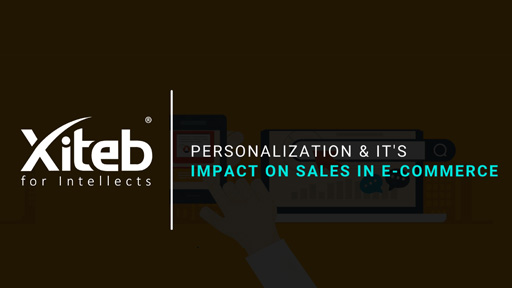Importance of Personalization in eCommerce

Personalization in ecommerce refers to the practice of tailoring the online shopping experience to each individual customer’s preferences and behaviors. It involves using data such as browsing history, purchase history, and demographic information to deliver customized product recommendations, personalized marketing messages, and a personalized user interface.

Personalization can take many forms in ecommerce, including:
- Product recommendations: Online retailers can use data on a customer’s browsing and purchase history to recommend products that are likely to be of interest to them. These recommendations can be displayed on the product page, in a dedicated section of the website, or through email or social media marketing.
- Personalized user interface: Ecommerce websites can be customized to reflect a customer’s browsing history and preferences, for example by displaying their favorite categories or products prominently on the homepage.
- Personalized marketing messages: Email and social media marketing campaigns can be customized to reflect a customer’s interests and behaviors, for example by sending targeted promotions based on their purchase history.
- Personalized pricing: Some ecommerce retailers are experimenting with personalized pricing, where the price of a product is tailored to a customer’s browsing and purchase history, as well as other factors such as location and time of day.
Personalization is becoming increasingly important in ecommerce for several reasons:
- Improved customer experience: Personalization helps to create a more engaging and relevant shopping experience for customers by tailoring product recommendations, marketing messages, and user interfaces to their interests and behaviors. This can lead to increased customer satisfaction, loyalty, and repeat purchases.
- Increased sales: Personalization can help to increase sales by suggesting relevant products and promotions that are more likely to resonate with customers. It can also help to reduce cart abandonment by providing personalized reminders and incentives to complete a purchase.
- Enhanced customer insights: Personalization requires the use of customer data, which can provide valuable insights into customer behavior and preferences. This information can be used to inform product development, marketing strategies, and other business decisions.
- Improved marketing efficiency: Personalized marketing messages are more likely to be effective, as they are tailored to the individual customer’s interests and behaviors. This can lead to higher conversion rates and a better return on investment for marketing campaigns.
- Competitive advantage: Ecommerce businesses that invest in personalization are more likely to stand out from their competitors by offering a more engaging and relevant shopping experience for customers. This can help to attract and retain customers in an increasingly competitive marketplace.
Top 3 Personalization Strategies for ecommerce businesses
- Behavior-based personalization involves analyzing a customer’s browsing and purchasing behavior to provide a more tailored shopping experience and focuses on creating different content types and targeting them to buyer personas derived out of the customer or user behavior.
This is done by creating different types of web content on your website with respect to the buyer personas you are targeting. These may be web content and Content-based ecommerce personalization is often accompanied rule-based personalization where buyers are categorized on the basis of certain actions that must be taken on those pages such as an ebook download. - Offer-based personalization in ecommerce involves tailoring product offers and promotions to individual customers based on their behavior and preferences. This approach involves analyzing customer data such as browsing and purchase history to identify products and offers that are most relevant to the individual customer.
For example, a customer who has recently viewed several products in a particular category may be offered a discount on a related product. Or a customer who has abandoned their cart may be sent a personalized email offering a discount or free shipping to encourage them to complete their purchase.
Offer-based personalization can help to increase sales and build customer loyalty by providing customers with relevant offers and promotions that they are more likely to be interested in. By tailoring the shopping experience to the individual customer, businesses can also improve customer engagement and satisfaction. - Personalized web pages in ecommerce refer to creating customized web pages for each individual customer based on their browsing and purchasing history. This type of personalization involves dynamically changing the content, layout, and recommendations on a website based on the individual user’s behavior.
For example, a personalized web page for a customer who frequently buys running shoes might feature new releases and popular products in that category. Alternatively, a customer who has previously purchased items in the women’s clothing category might see personalized recommendations for related items such as shoes, accessories, or handbags.
Personalized web pages can help to improve the customer experience by providing tailored content that is more relevant to each individual customer’s needs and preferences. This can lead to increased engagement, higher conversion rates, and greater customer loyalty. Additionally, personalized web pages can help businesses to better understand their customers’ needs and behaviors, which can inform future marketing and product development strategies.
Overall, personalization in ecommerce is a powerful tool for improving the customer experience, increasing sales, and gaining valuable insights into customer behavior. By leveraging customer data to provide tailored product recommendations, marketing messages, and user interfaces, ecommerce businesses can create a competitive advantage and build long-term customer loyalty.



1 Comment
Shnai Johnson · April 21, 2023 at 9:03 am
Thanks for your insightful article..